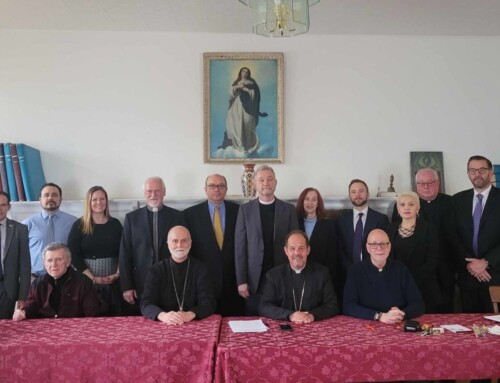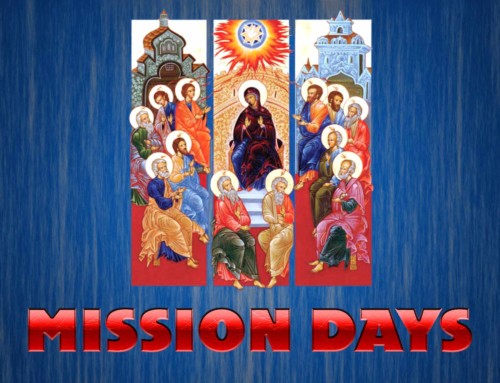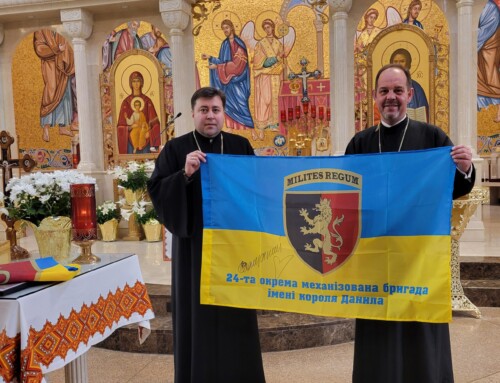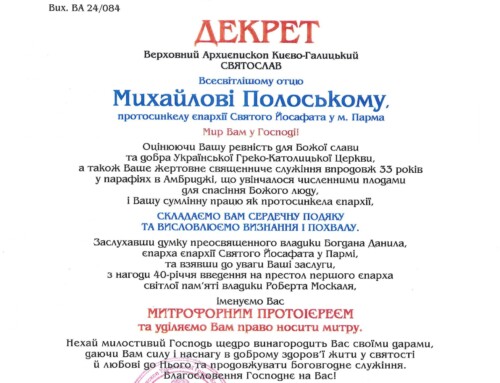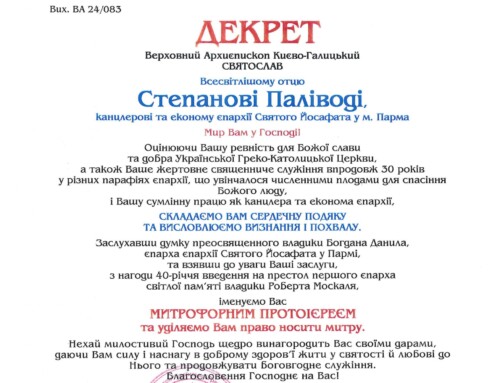Pastoral Ministry Office
Catechetical Guidelines for Catechesis
Introduction
“Our Lord Jesus Christ before his ascension into heaven instructed his disciples, saying: ‘Go therefore and make disciples of all nations, baptizing them in the name of the Father and of the Son and of the Holy Spirit, teaching them to observe all that I have commanded you. And behold, I am with you always, to the end of the age’ (Mat 28:18-29). This commission of Christ to proclaim the Good News was given not only to the first disciples, the apostles, it is directed to the Church in all times, even to the end of the ages. The Ukrainian Greek-Catholic Church, in fulfilling this commission of our Divine Savior, speaking through the Bishops of its Holy Synod five years ago, defined “Holiness of a united people of God” as the goal of her ministry. Holiness is God’s gift, and the vocation of every Christian. “For this is the will of God, your sanctification,” St. Paul reminds us in the letter to the Thessalonians (1 Th 4:2).
The parish is the place where Christian holiness most often germinates, grows, and matures. For this reason the Synod of Bishops of the Ukrainian Greek Catholic Church in 2011, in its concern for the spiritual renewal of our entire Church, focused its particular attention on the parish, that foundational portion of the People of God, which strives for holiness under the guidance of its bishop as father and teacher of the faith. The program, which the Holy Synod approved, is called, “The Vibrant Parish – a place to encounter the living Christ.” The goal of this pastoral program is to help all the faithful of our Church to learn “to live in order to please God” (1 Th 4:1), and thus to grow in holiness and unity in Christ Jesus.” (Pastoral Letter of His Beatitude Sviatoslav)
The key components or goals of a vibrant parish are:
The Word of God
The Holy Mysteries and Divine Liturgy
Serving One’s Neighbor
Leadership
Fostering and Serving Unity
A Missionary Spirit
Every Christian receives in the Mysteries of Christian Initiation the gift of God’s Life, which is lived out most fully in the Liturgical life of the Church. And every person, through the Mystery of Holy Baptism, Chrismation and Eucharist receives the vocation to share that divine life with others.
In our Kyivan Tradition, the traditional form or method of catechesis is known as “liturgical catechesis”[1] because its main purpose and aim is to incorporate the individual person ever deeper into the mystical life of the Church. Liturgical catechesis, then, is intimately tied to, founded upon, and directed toward the whole Liturgy, i.e. the Divine Office, the Mysteries and the Divine Liturgy. The Divine Liturgy is the Source and Summit of the fullness of Divine Life but we encounter Christ in all of the Church’s Liturgical Prayer.
The guidelines and directives outlined below are offered at the direction of our Eparch, Bishop Bohdan Danylo, in order to ensure continuity with and fidelity to our rich Tradition of Byzantine liturgical catechesis in our Ukrainian Catholic Church as explained in our catechism Christ Our Pascha.
Eparchial Catechesis of Adults
The General Directory for Catechesis (#80) says: “The definitive aim of catechesis is to put people not only in touch, but also in communion and intimacy, with Jesus Christ”
The Church community in a vibrant parish is the primary communicator of our faith Tradition and practices, and that the entire life of the Church is the curriculum and we need to incorporate the main goals of catechesis. Each and every one of us is responsible for the renewal of our parish communities. Christ’s commandments apply to all faithful Christians without exception. Together, we all form the One, Holy, Catholic, and Apostolic Church. That is why all of us need to be “living stones” as we build our parish community, through which the Church is present where we live. Let us become a vibrant community by being a Learning Community that grows ever closer to Christ and each other.
The Word of God
“Let the word of Christ dwell in you richly, teaching and admonishing one another in all wisdom,” St. Paul teaches us in the Epistle to the Colossians (Col 3:16). Through the Word of God we come to know Christ, we encounter Him, and enter into a living relationship with Him. “Ignorance of Scripture is ignorance of Christ,” said St. Jerome. In our parishes we want to follow the example of the first Christians so that the Word of God might become the foundation of our ecclesial, parochial, family, social, and personal life. Patriarch Sviatoslav strongly urged pastors to diligently prepare their homilies based on the proclaimed Word of God in such a way that this Word might become “living and active” in the life of our parishioners, capable of nourishing them, giving them answers to real issues of the day, and inspiring them to service.
The Word of God should bear visible fruit in our everyday lives because only those who keep this Word, that is, obey it, will be called blessed in the Lord (see Lk 11:28). In our parishes there should not be a single family which does not own a Bible. All our faithful should read the Sacred Scriptures on a daily basis; this is done ideally through participation in parish bible-study groups or through prayerful reading at home. The newly published Catechism of the Ukrainian Greek-Catholic Church, “Christ our Pascha,” is another essential volume which should become a handbook of faith for all the members of our Church – children, youth, and adults. The Catechism, according to Metropolitan Andrey (Sheptytsky), is the foundation of Christian life.
…all the members of our Church have a personal responsibility throughout their whole lives to acquire an ever deeper knowledge of the truth of the Holy Faith, while the clergy must not neglect their responsibility of teaching the faith to their parishioners, not only through preaching, but also through catechetical instruction. When we speak of catechesis, we understand this to be a continuous process – i.e. life long – of entering into the mystery of the Church… Permanent and continuous formation for various age groups – children, youth, adults, and the elderly – is an essential component of the vibrant parish. … the Bible, so too the Catechism of our Church should be a handbook for each member of our community as it is a most valuable aid for a proper understanding and reading of the Word of God.” (Pastoral Letter of His Beatitude Sviatoslav)
Resources that can be used for personal or group Bible Study:
Scriptural texts in Christ Our Pascha
GWUP – Scripture from an Eastern Perspective – https://store.godwithusbooks.org/scriptural-study/
DeSales Series on the Old and New Testament in DVD or VHS format from the Pastoral Ministry Office
Lectio Divina – http://www.usccb.org/beliefs-and-teachings/how-we-teach/catechesis/catechetical-sunday/word-of-god/upload/lectio-divina.pdf
Gospel Reading and Reflection – https://www.royaldoors.net/2017/09/welcome-resource-site-catechism-christ-pascha/
Holy Mysteries (Sacraments) and The Divine Liturgy
“The Word of God is the foundation of Christian life, while the Holy Eucharist is its source and at the same time its culmination. Gathered at the Divine Liturgy, the parish community unites with its invisible head, Christ, and with all the saints and angels, thus enacting a mystical union between heaven and earth, between time and eternity. The Divine Liturgy, which a duly appointed priest celebrates in unity with and on behalf of his bishop, is also a time of building up the Church, the body of Christ, which has our Lord as its Head. There is no moment more precious in our earthly life than the Divine Liturgy. That is why Sunday, the Holy Day of our Lord, should be honored by every Christian, and participation in the Divine Liturgy should be considered not as an obligation imposed by the Church, which requires our obedience, but it should be received as a gift from our Lord, who longs to encounter us, in order to fill us with His grace and love. “We cannot live without Sunday!” was the motto of the early Christians of the first centuries, and they preferred a martyr’s death to agreeing under pressure from the pagans to work on Sunday. This motto we Christians of the 21st century must make our own, and we should persistently guard the holiness and inviolability of the Lord’s Day.
Members of a vibrant parish also actively participate in the Holy Mysteries (Sacraments). Regularly, if possible even daily, they gather for the services in praise of our Heavenly Father. They frequently go to Confession and receive Holy Communion. In a vibrant parish church organizations combine their activities with common prayer, finding in it their strength and inspiration. No less important is our private prayer – personal and family prayer – which extends and continues our liturgical prayer in the Church. Our parishes, and in them our families, must again become a school of prayer for all of our faithful.” (Pastoral Letter of His Beatitude Sviatoslav)
Resources that can be used:
Christ Our Pascha – Part 2 “The Prayer of the Church”
Inexhaustible Delights – The Mysteries of Our Church (GWUP) –
https://store.godwithusbooks.org/index.php?p=catalog&mode=search&search_str=Inexhaustible+Delights
Catechist Formation books from GWUP
“New Life in the Trinity” – DVD – PMO
“Sacrifice of Praise” – DVD – PMO
“Kiss of Christ” – DVD – PMO
https://stjosaphateparchy.com/pastoral-office-videos/
Serving One’s Neighbor
Another important element, which expresses the inner nature of the Church and reveals the vibrancy of a parish is diakonia, which means serving in love or performing “charitable activity.” This service to our neighbor flows from our rootedness in Christ. Active love of neighbor is the vocation and task of each Christian without exception. It is only faith, acting in love, which leads us to salvation (see Gal. 5:6). Faith without works is dead (see James 2:26). “As you did it to one of the least of these my brethren, you did it to me” (Mat. 25:40), – says the Lord Jesus.
Let us look around us – in this world there is so much tragedy and poverty, so much loneliness and sorrow, pain and suffering! All the challenging circumstances of our life on earth – these are for us an invitation to active love, which is an expression of living faith. The Lord wants to open our eyes to the suffering world so that we might learn to truly love and to express God’s love to our neighbor – by our attention to them, by our sincere sympathy, support, by our words of encouragement and good cheer, but mainly, through acts of mercy. It is only then that we can consider ourselves vibrant Christians and our parishes can become places where care is given to the orphan, protection for the widow, help for the poor, and where the suffering of the sick is shared. Thus we will reveal to the world the maternal face of the Church and will become the living sign of the presence of God among humankind, according to the words of St. Augustine: “If you see charity, you see the Trinity.” (Pastoral Letter of His Beatitude Sviatoslav)
Resources that can be used:
Christ Our Pascha – Part “The Life of the Church”
Leadership
“The parish is a community of faithful who, under the leadership of the bishop and their pastors, fulfill their calling to unity with God the Father through our Lord Jesus Christ in the Holy Spirit. The Lord Jesus constantly acts in our communities through the Holy Spirit sending down His gifts for the development and growth of His Body. The Apostle Paul thus explains: “And his gifts were that some should be apostles, some prophets, some evangelists, some pastors and teachers, to equip the saints for the work of ministry, for building up the body of Christ, until we all attain to the unity of the faith and of the knowledge of the Son of God, to mature manhood, to the measure of the stature of the fullness of Christ,” (Eph 4:11-13). The leadership of the parish community is exercised under the leadership of the bishop as head and father. Each parish should be an organized community in which, under the care of their pastor and in cooperation with him, members serve one another according to the gifts which they received from the Lord.
Therefore, church leadership is not the fulfillment of a particular administrative office, but first of all service to God and neighbor. In practice this means that for a parish to be vibrant, it must have active parish and pastoral councils. In addition, a parish must have well-formed and mature co-workers who assist the priest in leading catechetical schools, church brotherhoods, charitable works, youth organizations and prayer groups. One of the most important responsibilities of leadership in the parish community is discerning God’s will and searching for the best ways of implementing it in the life of the parish.” (Pastoral Letter of His Beatitude Sviatoslav)
Resources that can be used:
http://www.stjosaphatcathedral.com/wp-content/uploads/2016/04/12.-a.-PastoralPlanning-ENG-LTR-Final.pdf
http://www.jgray.org/codes/cceo90eng.html
http://www.intratext.com/x/eng1199.htm
Fostering and Serving Unity – Ecumenism
“The Acts of the Apostles convey a sense of profound unity which existed among the members of the first community of Christ’s disciples: “The community of believers was of one heart and mind, and no one claimed that any of his possessions was his own, but they had everything in common”.(Act 4:32). This spiritual state of being of the first Christian community can be expressed with the term koinonia (communion) which conveys unity, harmony and common life. To be Church is to abide in the communion of the Holy Spirit, the grace of our Lord Jesus, and the love of God the Father. Thus, the unity of the church is an icon of the unity of Persons of the Holy Trinity. This unity can be seen on different levels: on the level of the Universal and Particular Church, the eparchy, and the individual parish. It may happen that through our weakness and sinfulness we do not reflect this unity. Ever aware of this, we all must cherish and foster unity, preserving full communion with the successor of the apostle Peter, the Holy Father, with the hierarchy of our Church, with the local bishops and pastors who act in their name.
The parish is a community of communities. In a parish there will be various prayer groups, brotherhoods, and youth organizations. All of these are called to strengthen unity and love among the members of the parish community. By supporting one another through prayer, by sharing God’s gifts and working together in a Christ-like spirit of service, we will be able to bring to life our synodal program: “Holiness of a united people of God.” We cannot be indifferent to the fact that the descendants of the Baptism under St. Volodymyr today are divided and estranged from one another. At the Last Supper, Christ prayed to His Heavenly Father for His disciples, “that all may be one” (John 17:21). Bearing in mind these words of Christ, I sincerely ask you all today – let us pray for the unity of the Church, let us pray for the restoration of unity of all the churches of the Kyivan tradition. And above all, in the spirit of the love of Christ, let us make every effort to avoid any words or actions which could damage our brothers and sisters in Christ or offend them. Even though at times we may be subjected to mockery and pressure, let us not give in to the temptation to respond to evil with evil. May Christ’s prayer for his wrong-doers and the teaching of the Apostle of the Nations become a testament for us: “Do not be overcome by evil, but overcome evil with good” (Rom 12:21).” (Pastoral Letter of His Beatitude Sviatoslav)
Resources that can be used:
http://news.ugcc.ua/en/ecumenism/
Missionary Spirit of the Parish Community
“Jesus Christ said to His disciples: “You are the salt of the earth… you are the light of the world” (Мt. 5:13- 14), and by this He calls us to reach outside our church communities to carry
Christ’s teaching into the world, to transform the world with the Spirit of Christ. A church community, renewed in the Holy Spirit, by its very life becomes a living sermon of Christ and His presence. Here it is worth mentioning one of the favorite phrases of Saint John XXIII, that “the parish is the fountain at the center of the village, to which all come to quench their thirst.” It is our wish that our parishes become such spiritual well-springs so that people would be drawn to them, and be able to find support and strength, love and grace – in one word, salvation.
Returning to the Lord’s commission with which we began this letter, we will note: Jesus Christ teaches us that we are to be ready to bear witness to Him not only with our life, but also in word. Frequently it is the case today that Christians are ashamed to acknowledge their faith, hiding it by their silence and passivity, instead of defending the Church of Christ and standing in the defense of the rights and dignity of the human person. Our pastoral initiatives, catechesis, Divine services, the reading of God’s word, etc. should make us strong and unwavering in our faith, as well as always ready “to make a defense to anyone who asks you for a reason for the hope that is in you” (1Pt 3:15).” (Pastoral Letter of His Beatitude Sviatoslav)
Resources that can be used:
Christ Our Pascha – Part 3 “The Life of the Church”
https://www.youtube.com/watch?v=IZ_X5g5pUWQ&t=0s&index=9&list=PLYZIHoNaQbq9zFiSnm4SOiSGhH1GKscNN
Key Concepts in Adult Learning
The most important understanding for adults is the knowledge that none of the formulations or symbols used to talk about God can fully express the depths of the reality of God. For this reason the single most valuable outcome for the mature adult is hunger for more life-long learning. Some characteristics of adult learning are the following:
- Adult learners are self-directed
Adults are autonomous and self-directed. They need to be free to direct themselves. It is best to involve adult participants actively in the learning process and to provide a model of group process offered with facilitation. Adult participants want to be involved in covering topics and projects that reflect their interest.
- Adult learners set the goals and time lines for the learning experience
Adults are goal-oriented. They appreciate a program or process that is organized and has clearly defined elements. They want to know how this event will help them to attain their goals.
- Adult learners will learn when they experience a desire to learn the topic/material
Adults are practical; focusing on the aspects of what is most useful to them at this time. They may not be interested in knowledge for its own sake.
- Adult education is a process of developing increased self-actualization
Adult learners need to be shown respect and encouragement and as they share knowledge from their life experience freely with others.
- Educational techniques for adult learners are experiential and respond to the adult’s readiness and desire to learn
Adults are relevancy oriented; they must see a reason for learning something. It is important that objectives be clear to adult learners in the beginning in order for them to become fully engaged in the process.
Provisions for The Catechesis Of Children in St. Josaphat Eparchy
In preparation for the beginning of the Catechetical Year, the Pastoral Ministry Office will provide resources for “Catechetical Sunday.” Pastors and catechetical coordinators are asked to make use of these resources by distributing the materials provided, printing flyers and posters, promoting the theme of the Catechetical Year, and generally following the theme of the year in their programs.
- God With Us catechetical books are the approved texts for the USA – they can be ordered at http://store.godwithusbooks.org/catechetical-series/
- The Ukrainian version of the God With US series is online at https://kk-kgva.org.ua/katexitichna-serija-z-nami-bog.html
- Some Ukrainian videos can be found on https://stjosaphateparchy.com/vacation-with-god/ and https://kk-kgva.org.ua/index.php/multfilmi.html
- On October 1 of each year, Pastors will receive a request to update their parish Catechist list and contact information. Pastors are asked to submit their updated Catechist list to the Pastoral Ministry Office no later than November 1 of that year. The updated Catechist Directory will be used by the Pastoral Ministry Office to provide catechetical resources and publish news and announcements throughout the year.
- Each week the Pastoral Ministry Office will email resources to Catechetical Coordinators.
- “Seasonal” catechetical material designed to assist with catechesis within the domestic church will be made available for the fasts and feasts and emailed to pastors and catechetical coordinators.
GUIDELINES for Catechesis of Children
- Catechetical classes are to take place at a time that does not conflict with Sunday Divine Liturgy;
- Catechesis should be experiential in nature;
- Parents are the primary catechists of their children;
- Catechists in our Byzantine Tradition serve more as guides, tutors, and models of Christian life, rather than simply as teachers and classroom administrators, and those whom they lead are to be treated more like disciples learning to follow Christ than mere students and participants in a program;
- Catechetical classrooms should have an icon corner, in the eastern corner of the room if possible;
- Each child enrolled in our catechetical program should have their own Bible and bring it to each class;
- Educational content should conform to the liturgical cycle in which the Church is living;
- Religious education should be in accord with the teachings of the Ukrainian Catholic Church.
STANDARD STRUCTURE FOR THE CATECHETICAL YEAR IN ST. JOSAPHAT EPARCHY
- The Catechetical Year should begin in the month of September with “Catechetical Sunday.”
- Prior to teaching, every Catechist and Catechist Assistant must have completed and been certified through the Virtus safe environment program and have submitted documentation, including a background check, to the parish Catechetical Coordinator.
- Once the Catechetical Year is launched, an updated Catechist Directory with contact information should be emailed to the Pastoral Ministry Office. Parishes are requested to submit the updated directory no later than November 1.
- In addition to the Catechists’ Directory, parishes are requested to submit an enrollment report, detailing the number of students and families that are registered in the parish catechism program, the number and level of classes provided, and comparison chart to the previous Catechetical Year.
- Catechism classes should take place weekly at the appointed time which does not conflict with Sunday Divine Liturgy.
- At least twice during the Catechetical Year, all students should be brought into the Church for Holy Repentance.
- As explained above, educational content presented by the catechetical textbook in use and determined by the schedule of the academic year, should conform to or in some way be conformed to the liturgical season in which the church is living. As fasting and feasting seasons change, seasonal catechetical programs will be provided. Catechist Coordinators and Catechists should distribute these publications to parents and integrate them into their catechesis each week.
- The Catechetical Year should conclude in the month of May with an end of the year program or ceremony”. At the conclusion of the Catechetical Year, a progress report should be submitted to the Pastoral Ministry Office outlining the overall health of the parish program and sharing particular successes and challenges which the parish catechism program experienced during the Catechetical Year.
Suggested Structure for Catechetical Classes in the Eparchy Of St. Josaphat
- Arrive early for set up and prayer. To follow proper safety procedures, the catechist should arrive in the classroom prior to any student. Because the Catechist is a guide and example, upon entering the classroom, Catechists are encouraged to pray before the icon of Christ the Teacher that he or she may fulfill the ministry of catechesis through the gift of the Holy Spirit, and that the students may be open to receiving the gift of Divine Life.
- Students begin by reverencing the icon. When students / disciples arrive to the classroom they should be accustomed to immediately go to the icon corner to reverence the Icon of Christ or festal icon before being seated. While students are arriving, a CD or smart phone with the Resurrectional Troparion for that Sunday may be played quietly.
- Classes should begin and end on time. Catechetical classes should begin at the appointed time and should not be delayed for late arrivals. If some students have not yet arrived, class should begin without them. When late arrivals enter the classroom, they should immediately go to the icon corner, reverence the Icon of Christ and join the class quietly. The class instruction should not be interrupted to bring the student up to speed unless absolutely necessary.
- Classes might begin with the Trisagion Prayers. Once the time for class has arrived, the students are asked to proceed to the icon corner once more and the class prays the Trisagion prayers together (this could be led by a particular child who has prepared himself or by the class as a whole). Over time, as Catechists and students become familiar with the prayers, this part of the class will become natural and take very little time to complete. Once familiar, this part of the class should take no more than three minutes.
- Use the appropriate section of the God With Us catechetical series. The catechetical lesson in the God With Us series is covered with activities suggested – depending on time. Catechists should not attempt to cover every aspect of the material presented in the God With Us lesson, but rather focus the student’s attention on the most central points. The details of the lesson and the entirety of the unit are to be reviewed and taught at home by the parents. Catechists are encouraged to prayerfully prepare themselves each week for this important time with their students and they should make an effort to present the catechetical lesson within the context of the liturgical cycle in which the Church is living. The Bible, as the “language” of catechesis, should be used regularly throughout the instruction and students should be encouraged to open their Bible and read passages allowed whenever there is an opportunity. In classes for younger ages a craft project is commonly worked on during some part of the catechetical lesson.
- Conclude the class by reverencing the Icon of Christ.
For more information, clarification or any other catechetical need, please contact Sr. Ann Laszok, OSBM at [email protected] or 412-260-1607
Summary of all Resources that can be used:
Scriptural texts in Christ Our Pascha – online version
GWUP – Scripture from an Eastern Perspective – https://store.godwithusbooks.org/scriptural-study/
DeSales Series on the Old and New Testament in DVD or VHS format from the Pastoral Ministry Office
Lectio Divina – http://www.usccb.org/beliefs-and-teachings/how-we-teach/catechesis/catechetical-sunday/word-of-god/upload/lectio-divina.pdf
Gospel Reading and Reflection – https://www.royaldoors.net/2017/09/welcome-resource-site-catechism-christ-pascha/
Inexhaustible Delights – The Mysteries of Our Church (GWUP) –
https://store.godwithusbooks.org/index.php?p=catalog&mode=search&search_str=Inexhaustible+Delights
Catechist Formation books from God With Us Publications (GWUP)
“New Life in the Trinity” – DVD – PMO
“Sacrifice of Praise” – DVD – PMO
“Kiss of Christ” – DVD – PMO
https://stjosaphateparchy.com/pastoral-office-videos/
http://www.stjosaphatcathedral.com/wp-content/uploads/2016/04/12.-a.-PastoralPlanning-ENG-LTR-Final.pdf
http://www.jgray.org/codes/cceo90eng.html
http://www.intratext.com/x/eng1199.htm
http://news.ugcc.ua/en/ecumenism/
https://www.youtube.com/watch?v=IZ_X5g5pUWQ&t=0s&index=9&list=PLYZIHoNaQbq9zFiSnm4SOiSGhH1GKscNN
God With Us catechetical books are the approved texts for the USA – they can be ordered at http://store.godwithusbooks.org/catechetical-series/
The Ukrainian version of the God With US series is online at https://kk-kgva.org.ua/katexitichna-serija-z-nami-bog.html
Some Ukrainian videos can be found on https://stjosaphateparchy.com/vacation-with-god/ and https://kk-kgva.org.ua/index.php/multfilmi.html
Much of what is developed, this and other quotations, in these Eparchial Guidelines is drawn from Liturgy and Life: Lectures and Essays on Christian Development through Liturgical Experience, Alexander Schmemann. New York: Dept. of Religious Education, Orthodox Church in America, 1974. Catechists are encouraged to read the entirety of this seminal work.

